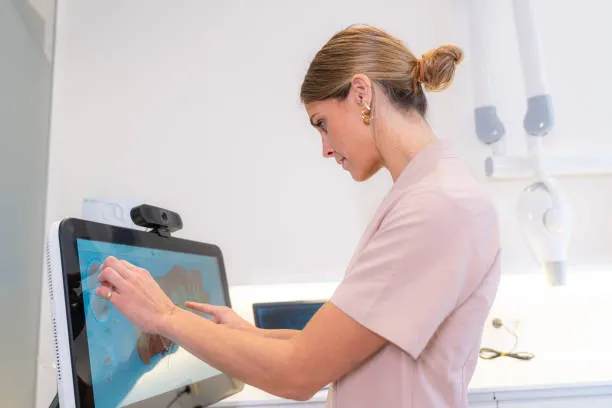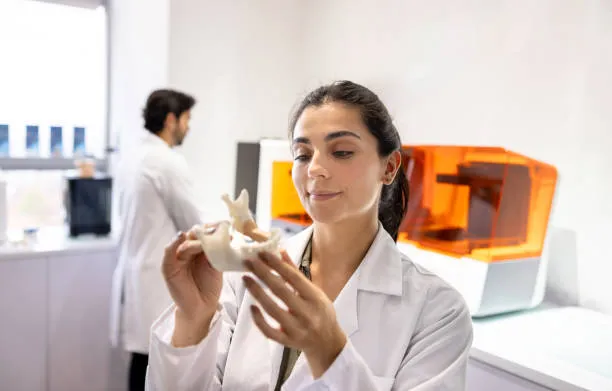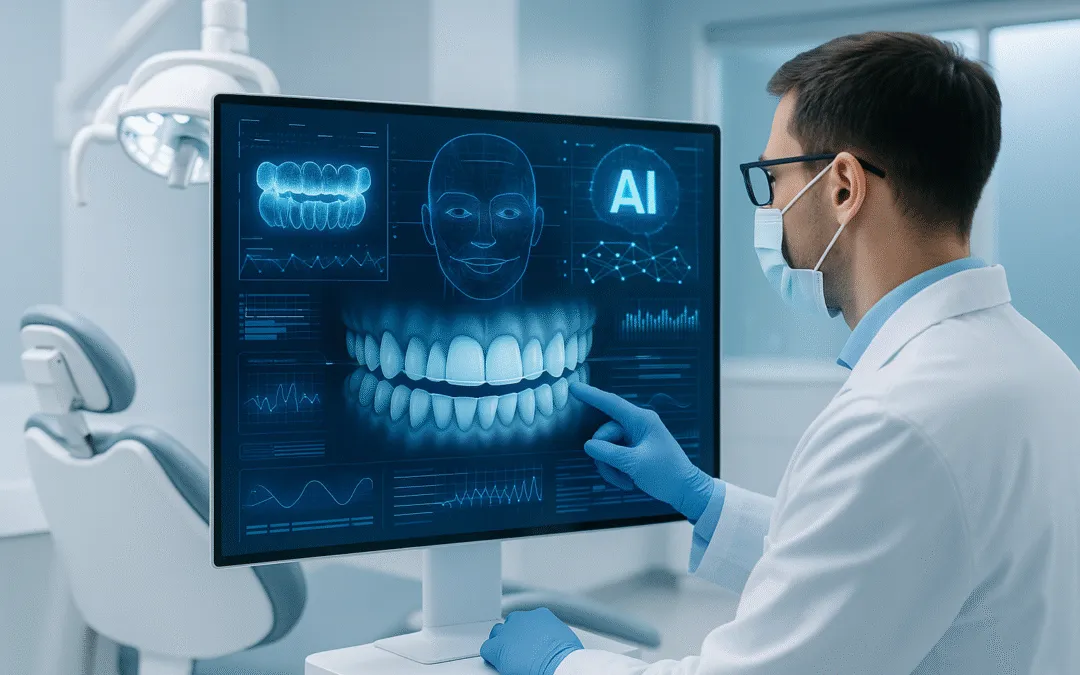Good oral health is more than a perfect smile—it’s crucial to overall well-being. With technology transforming every aspect of healthcare, dentistry is no exception. The use of Artificial Intelligence in dentistry is becoming a powerful force globally and in India, enhancing the precision, personalization, and predictability of dental care.
According to a 2024 report by the Global Market Insights, AI in dentistry is projected to exceed USD 3.8 billion by 2032, growing at a CAGR of over 29%. In India alone, AI-related dental startups and tech innovations have surged by 42% over the last three years, reflecting a significant push toward tech-driven dental care.
Dr. Amol Pradhan, an acclaimed prosthodontist in Matunga, Mumbai, explains:
“AI isn’t here to replace dentists—it’s here to empower them. With access to vast datasets, AI tools can detect patterns a human might miss. This allows dentists to diagnose earlier, plan better, and ensure more effective outcomes. We’re witnessing a true synergy between human expertise and machine intelligence.”
But what exactly is this technology doing behind the scenes? Let’s dive in.
What role does AI play in modern dentistry
AI plays a transformative role in modern dentistry by enhancing precision, efficiency, and patient outcomes. From automating diagnostic processes using radiographic image analysis to assisting in smile designing and treatment simulations, AI helps dentists make faster, data-driven decisions. It also supports patient engagement through personalized follow-ups and predictive care planning, reshaping how dental care is delivered.

Here’s how AI is used in real-time dental settings:
Diagnostic Imaging Interpretation: AI tools analyze dental X-rays, CBCT scans, and intraoral images to identify cavities, bone loss, or oral lesions.
Predictive Analysis: AI predicts oral disease progression based on patient history and lifestyle data.
Virtual Assistance: AI chatbots and scheduling tools improve clinic efficiency and patient communication.
The role of AI in dentistry is multifaceted—bringing consistency, speed, and accuracy where manual methods can fall short.
Diagnostic Accuracy Enhanced by AI
When it comes to diagnosing oral health issues, early and accurate detection can make all the difference. AI is revolutionizing diagnostic protocols in the following ways:
Enhanced Radiograph Analysis
AI in dental radiology interprets dental X-rays with superior precision. Machine learning models are trained on thousands of radiographs, allowing them to detect early signs of decay, periapical lesions, or impacted teeth—sometimes before they become visible to the human eye.
Faster Detection of Oral Diseases
AI helps identify oral cancers, periodontal disease, and abnormalities with quicker turnaround, minimizing human error and delay in treatment.
Objective Diagnosis
Unlike traditional diagnoses that may vary between practitioners, AI provides standardized interpretation, ensuring reliable outcomes.
Dr. Sunita Pradhan, a trusted dental specialist in Matunga, Mumbai, shares:
“AI gives us a second pair of eyes. The accuracy in identifying hidden caries or early bone density loss is astonishing. It supports the dentist’s judgment and adds a layer of confidence to the diagnosis.”
Personalized Treatment Planning Using AI

One of the most exciting benefits of using AI in dentistry is how it enables highly customized treatment plans. Here’s how:
3D Modeling for Orthodontics
AI creates 3D models of the patient’s jaw, enabling orthodontists to map out tooth movements and aligner stages with extreme accuracy.
Implant Simulation
AI software simulates implant placement digitally, reducing errors and increasing success rates.
Risk Assessment
Using patient history, genetics, and behavioral data, AI predicts how a patient may respond to different treatments—allowing the dentist to choose the safest and most effective option.
AI in Pediatric Dentistry
In children, early intervention is critical. AI helps monitor growth and dental development, identifying early signs of crowding or bite issues.
The result? Treatments are faster, less invasive, and better tailored to the individual.
Dr. Vishal M. Dhanjani, a specialist in adult orthodontics, explains:
“We’re now able to design treatments that are completely patient-centric. AI evaluates factors we might overlook—lifestyle, genetic predispositions, even behavioral patterns—allowing for more holistic care.”
Benefits of AI Integration in Clinical Dentistry
AI is helping dental professionals and patients alike. Here’s a clear view of how:
Reduced Human Error
With AI-assisted tools, diagnostic and treatment errors drop significantly, improving patient safety.
Improved Workflow Efficiency
Automated scheduling, billing, and patient follow-up systems allow dental clinics to run more smoothly and reduce wait times.
Enhanced Patient Engagement
AI-powered apps and virtual assistants keep patients informed, increasing adherence to care plans.
Data-Driven Decisions
AI collects and processes large volumes of data to support evidence-based decisions in treatment and practice management.
Minimally Invasive Procedures
AI assists in pre-planning procedures, reducing chair time and ensuring less invasive interventions.
Limitations and Ethical Considerations
Before embracing AI fully, it’s crucial to understand its limitations and risks:
- Lack of human empathy and intuition
- Over-reliance may reduce clinical judgment
- Initial implementation costs are high
- Data privacy concerns
- Patient records and health data need strong encryption and privacy laws to prevent misuse
- Algorithmic bias
- If trained on skewed data, AI tools can give inaccurate predictions, especially for underrepresented groups.
Dr. Amol Pradhan cautions:
“We need to be careful not to treat AI as a magic wand. It’s a powerful tool, but it’s only as good as the data it learns from. Transparency, data privacy, and ethical oversight must guide how we use it in patient care.”
How Dental Creations Incorporates AI into Patient Care
At Dental Creations, we believe that technology should enhance—not replace—the human touch in dentistry. That’s why our approach to AI in dental care is thoughtful and patient-centric.

Here’s how we integrate AI into your dental experience:
Smart Diagnostics:
We use AI-supported imaging tools to spot dental problems early, even before symptoms appear.
Treatment Personalization:
Each treatment plan is AI-assisted and custom-built, factoring in your dental history, preferences, and risk factors.
Time-Saving Efficiency:
Our appointment scheduling and reminders are automated, so you never miss a check-up.
Patient Education Tools:
Interactive AI apps help explain procedures, timelines, and aftercare instructions for better clarity.
This balance of precision and personalization ensures that your care is both high-tech and high-touch.
FAQ
Can AI detect dental problems better than a dentist?
Is AI safe to use in patient care?
Will AI reduce my treatment time?
Can AI replace dentistry?
Does AI impact the cost of dental treatment?
Is my personal data safe when AI is used in treatment planning?
Disclaimer: The information shared in this content is for educational purposes only and not for promotional use.

